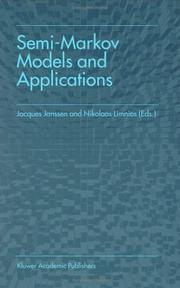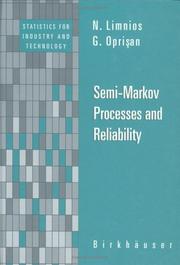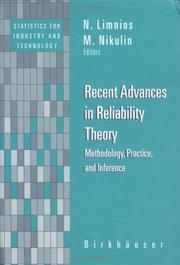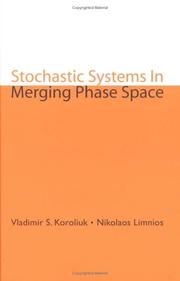| Listing 1 - 9 of 9 |
Sort by
|

ISBN: 0792359631 Year: 1999 Publisher: Dordrecht ; Boston : Kluwer Academic Publishers,
Abstract | Keywords | Export | Availability | Bookmark
 Loading...
Loading...Choose an application
- Reference Manager
- EndNote
- RefWorks (Direct export to RefWorks)

ISBN: 9780817641962 0817641963 3764341963 1461266408 1461201616 Year: 2001 Publisher: Boston : Birkhäuser,
Abstract | Keywords | Export | Availability | Bookmark
 Loading...
Loading...Choose an application
- Reference Manager
- EndNote
- RefWorks (Direct export to RefWorks)
At first there was the Markov property. The theory of stochastic processes, which can be considered as an exten sion of probability theory, allows the modeling of the evolution of systems through the time. It cannot be properly understood just as pure mathemat ics, separated from the body of experience and examples that have brought it to life. The theory of stochastic processes entered a period of intensive develop ment, which is not finished yet, when the idea of the Markov property was brought in. Not even a serious study of the renewal processes is possible without using the strong tool of Markov processes. The modern theory of Markov processes has its origins in the studies by A. A: Markov (1856-1922) of sequences of experiments "connected in a chain" and in the attempts to describe mathematically the physical phenomenon known as Brownian mo tion. Later, many generalizations (in fact all kinds of weakenings of the Markov property) of Markov type stochastic processes were proposed. Some of them have led to new classes of stochastic processes and useful applications. Let us mention some of them: systems with complete connections [90, 91, 45, 86]; K-dependent Markov processes [44]; semi-Markov processes, and so forth. The semi-Markov processes generalize the renewal processes as well as the Markov jump processes and have numerous applications, especially in relia bility.
Markov processes --- Reliability (Engineering) --- Markov, Processus de --- Fiabilité --- Statistical methods --- Méthodes statistiques --- Markov processes. --- Statistical methods. --- Fiabilité --- Méthodes statistiques --- Quality control. --- Reliability. --- Industrial safety. --- Computational intelligence. --- Probabilities. --- Quality Control, Reliability, Safety and Risk. --- Computational Intelligence. --- Probability Theory and Stochastic Processes. --- Probability --- Statistical inference --- Combinations --- Mathematics --- Chance --- Least squares --- Mathematical statistics --- Risk --- Intelligence, Computational --- Artificial intelligence --- Soft computing --- Industrial accidents --- Industries --- Job safety --- Occupational hazards, Prevention of --- Occupational health and safety --- Occupational safety and health --- Prevention of industrial accidents --- Prevention of occupational hazards --- Safety, Industrial --- Safety engineering --- Safety measures --- Safety of workers --- Accidents --- System safety --- Dependability --- Trustworthiness --- Conduct of life --- Factory management --- Industrial engineering --- Sampling (Statistics) --- Standardization --- Quality assurance --- Quality of products --- Prevention
Book
ISBN: 9780387731735 0387731717 9780387731711 9786611960063 1281960063 0387731733 Year: 2008 Volume: 191 Publisher: New York : Springer,
Abstract | Keywords | Export | Availability | Bookmark
 Loading...
Loading...Choose an application
- Reference Manager
- EndNote
- RefWorks (Direct export to RefWorks)
This book is concerned with the estimation of discrete-time semi-Markov and hidden semi-Markov processes. Semi-Markov processes are much more general and better adapted to applications than the Markov ones because sojourn times in any state can be arbitrarily distributed, as opposed to the geometrically distributed sojourn time in the Markov case. Another unique feature of the book is the use of discrete time, especially useful in some specific applications where the time scale is intrinsically discrete. The models presented in the book are specifically adapted to reliability studies and DNA analysis. The book is mainly intended for applied probabilists and statisticians interested in semi-Markov chains theory, reliability and DNA analysis, and for theoretical oriented reliability and bioinformatics engineers. It can also serve as a text for a six month research-oriented course at a Master or PhD level. The prerequisites are a background in probability theory and finite state space Markov chains. Vlad Stefan Barbu is associate professor in statistics at the University of Rouen, France, Laboratory of Mathematics ‘Raphaël Salem.’ His research focuses basically on stochastic processes and associated statistical problems, with a particular interest in reliability and DNA analysis. He has published several papers in the field. Nikolaos Limnios is a professor in Applied Mathematics at the University of Technology of Compiègne. His research interest concerns stochastic processes and statistics with application to reliability. He is the co-author of the books: Semi-Markov Processes and Reliability (Birkhäuser, 2001 with G. Oprisan) and Stochastic Systems in Merging Phase Space (World Scientific, 2005, with V.S. Koroliuk).
Markov processes --- Reliability (Engineering) --- DNA --- Markov, Processus de --- Fiabilité --- Mathematical models --- Analysis --- Modèles mathématiques --- DNA --Analysis --Mathematical models. --- Markov processes. --- Reliability (Engineering) --Mathematical models. --- Evaluation Studies as Topic --- Probability --- Stochastic Processes --- Epidemiologic Research Design --- Investigative Techniques --- Nucleic Acids --- Statistics as Topic --- Mathematical Concepts --- Nucleic Acids, Nucleotides, and Nucleosides --- Epidemiologic Methods --- Analytical, Diagnostic and Therapeutic Techniques and Equipment --- Health Care Evaluation Mechanisms --- Quality of Health Care --- Public Health --- Phenomena and Processes --- Chemicals and Drugs --- Environment and Public Health --- Health Care Quality, Access, and Evaluation --- Health Care --- Markov Chains --- Models, Theoretical --- Reproducibility of Results --- Mathematics --- Physical Sciences & Mathematics --- Mathematical Statistics --- Mathematical models. --- Fiabilité --- Modèles mathématiques --- EPUB-LIV-FT LIVMATHE LIVSTATI SPRINGER-B --- Deoxyribonucleic acid --- Desoxyribonucleic acid --- Thymonucleic acid --- TNA (Nucleic acid) --- Analysis, Markov --- Chains, Markov --- Markoff processes --- Markov analysis --- Markov chains --- Markov models --- Models, Markov --- Processes, Markov --- Mathematics. --- Bioinformatics. --- Operations research. --- Management science. --- Probabilities. --- Statistics. --- Quality control. --- Reliability. --- Industrial safety. --- Probability Theory and Stochastic Processes. --- Statistical Theory and Methods. --- Statistics for Engineering, Physics, Computer Science, Chemistry and Earth Sciences. --- Quality Control, Reliability, Safety and Risk. --- Operations Research, Management Science. --- Stochastic processes --- Deoxyribose --- Nucleic acids --- Genes --- Distribution (Probability theory. --- Mathematical statistics. --- System safety. --- Bio-informatics --- Biological informatics --- Biology --- Information science --- Computational biology --- Systems biology --- Safety, System --- Safety of systems --- Systems safety --- Accidents --- Industrial safety --- Systems engineering --- Statistical analysis --- Statistical data --- Statistical methods --- Statistical science --- Econometrics --- Statistical inference --- Statistics, Mathematical --- Statistics --- Probabilities --- Sampling (Statistics) --- Distribution functions --- Frequency distribution --- Characteristic functions --- Data processing --- Prevention --- Statistics . --- Quantitative business analysis --- Management --- Problem solving --- Operations research --- Statistical decision --- Operational analysis --- Operational research --- Industrial engineering --- Management science --- Research --- System theory --- Industrial accidents --- Industries --- Job safety --- Occupational hazards, Prevention of --- Occupational health and safety --- Occupational safety and health --- Prevention of industrial accidents --- Prevention of occupational hazards --- Safety, Industrial --- Safety engineering --- Safety measures --- Safety of workers --- System safety --- Dependability --- Trustworthiness --- Conduct of life --- Factory management --- Standardization --- Quality assurance --- Quality of products --- Combinations --- Chance --- Least squares --- Mathematical statistics --- Risk
Book
ISBN: 3030979628 3030979636 Year: 2022 Publisher: Cham, Switzerland : Springer,
Abstract | Keywords | Export | Availability | Bookmark
 Loading...
Loading...Choose an application
- Reference Manager
- EndNote
- RefWorks (Direct export to RefWorks)
Distribution (Probability theory) --- Statistics. --- Stochastic processes. --- Random processes --- Probabilities --- Statistical analysis --- Statistical data --- Statistical methods --- Statistical science --- Mathematics --- Econometrics --- Distribution functions --- Frequency distribution --- Characteristic functions --- Probabilitats --- Estadística matemàtica --- Estadística descriptiva --- Inferència estadística --- Matemàtica estadística --- Mètodes estadístics --- Estadística --- Anàlisi d'error (Matemàtica) --- Anàlisi de regressió --- Anàlisi de sèries temporals --- Anàlisi de variància --- Anàlisi multivariable --- Anàlisi seqüencial --- Astronomia estadística --- Correlació (Estadística) --- Dependència (Estadística) --- Estadística no paramètrica --- Estadística robusta --- Física estadística --- Mètode dels moments (Estadística) --- Models lineals (Estadística) --- Models no lineals (Estadística) --- Teoria de l'estimació --- Teoria de la predicció --- Tests d'hipòtesi (Estadística) --- Biometria --- Mostreig (Estadística) --- Càlcul de probabilitats --- Probabilitat --- Combinatòria (Matemàtica) --- Lògica --- Lògica matemàtica --- Descomposició (Matemàtica) --- Distribució (Teoria de la probabilitat) --- Fiabilitat (Enginyeria) --- Funcions característiques --- Geometria estocàstica --- Incertesa (Teoria de la informació) --- Integrals de camí --- Jocs d'atzar (Matemàtica) --- Mitjana (Estadística) --- Probabilitats combinatòries --- Processos estocàstics --- Sort --- Teoremes de límit (Teoria de probabilitats) --- Teoria matemàtica de la comunicació --- Variables aleatòries --- Atzar --- Risc (Economia) --- Teoria ergòdica
Book
Abstract | Keywords | Export | Availability | Bookmark
 Loading...
Loading...Choose an application
- Reference Manager
- EndNote
- RefWorks (Direct export to RefWorks)
Probabilités --- Manuels d'enseignement supérieur --- Problèmes et exercices

ISBN: 0817641351 9780817641351 3764341351 9783764341350 Year: 2000 Publisher: Boston Birkhauser
Abstract | Keywords | Export | Availability | Bookmark
 Loading...
Loading...Choose an application
- Reference Manager
- EndNote
- RefWorks (Direct export to RefWorks)
Stochastic processes --- Reliability (Engineering) --- Mathematical models

ISBN: 9789812565914 9812565914 9812703128 9789812703125 1281899119 9781281899118 9786611899110 6611899111 Year: 2005 Publisher: Singapore Hackensack, NJ World Scientific
Abstract | Keywords | Export | Availability | Bookmark
 Loading...
Loading...Choose an application
- Reference Manager
- EndNote
- RefWorks (Direct export to RefWorks)
This book provides recent results on the stochastic approximation of systems by weak convergence techniques. General and particular schemes of proofs for average, diffusion, and Poisson approximations of stochastic systems are presented, allowing one to simplify complex systems and obtain numerically tractable models. The systems discussed in the book include stochastic additive functionals, dynamical systems, stochastic integral functionals, increment processes and impulsive processes. All these systems are switched by Markov and semi-Markov processes whose phase space is considered in asympt
Stochastic processes --- Mathematical optimization --- Processus stochastiques --- Optimisation mathématique --- Stochastic processes. --- Mathematical optimization. --- Optimization (Mathematics) --- Optimization techniques --- Optimization theory --- Systems optimization --- Mathematical analysis --- Maxima and minima --- Operations research --- Simulation methods --- System analysis --- Random processes --- Probabilities
Book
ISBN: 9781848210578 Year: 2010 Publisher: London : Hoboken, NJ : ISTE ; Wiley,
Abstract | Keywords | Export | Availability | Bookmark
 Loading...
Loading...Choose an application
- Reference Manager
- EndNote
- RefWorks (Direct export to RefWorks)
Stochastic processes --- Stochastic models --- Processus stochastiques --- Modèles stochastiques
Book
ISBN: 0857291173 9786613083302 0857291181 1283083302 Year: 2011 Publisher: London : Springer-Verlag,
Abstract | Keywords | Export | Availability | Bookmark
 Loading...
Loading...Choose an application
- Reference Manager
- EndNote
- RefWorks (Direct export to RefWorks)
Nonparametric statistics has probably become the leading methodology for researchers performing data analysis. It is nevertheless true that, whereas these methods have already proved highly effective in other applied areas of knowledge such as biostatistics or social sciences, nonparametric analyses in reliability currently form an interesting area of study that has not yet been fully explored. Applied Nonparametric Statistics in Reliability is focused on the use of modern statistical methods for the estimation of dependability measures of reliability systems that operate under different conditions. The scope of the book includes: smooth estimation of the reliability function and hazard rate of non-repairable systems; study of stochastic processes for modelling the time evolution of systems when imperfect repairs are performed; nonparametric analysis of discrete and continuous time semi-Markov processes; isotonic regression analysis of the structure function of a reliability system, and lifetime regression analysis. Besides the explanation of the mathematical background, several numerical computations or simulations are presented as illustrative examples. The corresponding computer-based methods have been implemented using R and MATLAB®. A concrete modelling scheme is chosen for each practical situation and, in consequence, a nonparametric inference procedure is conducted. Applied Nonparametric Statistics in Reliability will serve the practical needs of scientists (statisticians and engineers) working on applied reliability subjects.
Nonparametric statistics. --- Reliability (Engineering) -- Statistical methods. --- Nonparametric statistics --- Reliability (Engineering) --- Mechanical Engineering --- Engineering & Applied Sciences --- Chemical & Materials Engineering --- Mathematics --- Physical Sciences & Mathematics --- Technology - General --- Mathematical Statistics --- Materials Science --- Industrial & Management Engineering --- Statistical methods --- System safety. --- Safety, System --- Safety of systems --- Systems safety --- Distribution-free statistics --- Statistics, Distribution-free --- Statistics, Nonparametric --- Engineering. --- Statistics. --- Quality control. --- Reliability. --- Industrial safety. --- Quality Control, Reliability, Safety and Risk. --- Statistics for Engineering, Physics, Computer Science, Chemistry and Earth Sciences. --- Accidents --- Industrial safety --- Systems engineering --- Mathematical statistics --- Prevention --- Statistical analysis --- Statistical data --- Statistical science --- Econometrics --- Statistics . --- Industrial accidents --- Industries --- Job safety --- Occupational hazards, Prevention of --- Occupational health and safety --- Occupational safety and health --- Prevention of industrial accidents --- Prevention of occupational hazards --- Safety, Industrial --- Safety engineering --- Safety measures --- Safety of workers --- System safety --- Dependability --- Trustworthiness --- Conduct of life --- Factory management --- Industrial engineering --- Sampling (Statistics) --- Standardization --- Quality assurance --- Quality of products
| Listing 1 - 9 of 9 |
Sort by
|

 Search
Search Feedback
Feedback About UniCat
About UniCat  Help
Help News
News